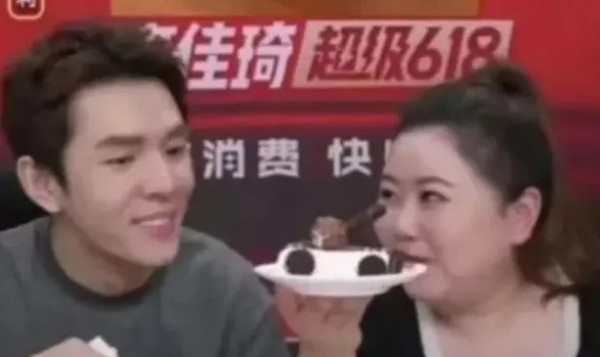
Li Jiaqi (left) famously fell victim to censorship | Image: Taobao Live
OPINION: How do you step onto a political landmine when selling a cake?
The answer is simple: give the cake four Oreo wheels and a wafer pipe, and show the tank-shaped cake to millions of followers around June 4, the anniversary of the Tian’anmen Square crackdown in 1989.
This is what happened to Li Jiaqi, the single most popular live streaming salesman in China. Boasting more than 60 million followers, Li has set a daunting sale record of 10.65 billion Yuan (US$ 1.59 billion) in one day.
On the evening of June 3, shortly after Li cracked a joke about the tank-shaped cake his assistant presented to the camera, the live streaming came to an abrupt end, leaving millions of his followers wondering why. Li later posted that he was experiencing “technical difficulties”, but it does not take much Chinese wisdom to decipher the code language. Many asked on Weibo (China’s equivalent of Twitter) “what happened to Li Jiaqi?”
Li’s young unwitting followers would soon find that their gossipy curiosity was unwelcome. China’s generation Z - including Li who was born in 1992 - are often genuinely unaware of the political sensitivity around June 4, because in their mind, nothing peculiar ever happened on that day 33 years ago. After vaguely learning why tanks were a sensitive topic from the coded online discussion, some Weibo users expressed shock while others jumped to the government’s defence. One user posted: “Our upright country never wants to hide anything! Always trust our country!” Another said: “If Li Jiaqi’’s ban has to do with 6.4, he is not wronged…so lucky that our country weathered the Colour Revolution, unlike the Soviet Union.”
As a reward to their patriotism, their Weibo accounts were soon cancelled.
To their surprise, when it comes to the Tian’anmen crackdown and many other political topics, the state forbids even patriotic support. The existence of support implies the existence of doubt, criticism, and even condemnation. The big brother wants something much better: ignorance.
Compared to their authoritarian neighbours, China’s censorship system has done exceptionally well in maintaining ignorance. Vietnam established a 10,000-strong army of online censors in 2017 to combat anti-government “wrongful views", yet it remains one of the largest markets for Facebook, Twitter and Google - meaning “wrongful views" are at least accessible. Thanks to the Great Firewall, increasingly submissive news media and systematic ideological education from childhood, young people in China know what they are expected to know, such as the universally acknowledged truth that the evil US is the number one global trouble maker. In the meantime, many stay perfectly unaware of what they are not expected to know.
But one who truly does not know what they are "not supposed to know", also does not know where they should tiptoe and shush. For ordinary people who accidentally cross one of these invisible lines, punishment such as deletion of post and account cancellation may just be inconvenient. But for celebrities and companies, it is a genuine and grave business risk. Li is not the first victim of ill-informed tank references. In 2017, the successful bicycle share company Bluegogo, once valued at US$140 million with over 20 million users, slumped into bankruptcy after launching a marketing campaign calling on its users to ride bikes with tank logos on June 3 and 4 to go into prize draw.
How should businesses and celebrities manage such risk? The paradoxical lesson is, they must "perfectly know" what they are "not expected to know", if they want to be absolutely safe from ruthless censorship crackdown.
The so-called Li Jiaqi paradox does not stop here. Censorship aims to suppress knowledge and discussion. But shushing influencers such as Li Jiaqi only encourages innocent inquiries into the mysterious “technical difficulties”, turning a prominent censorship exercise into a mass educational event. Censors end up sparking curiosity and spreading the very knowledge they seek to suppress.
It should be noted that overall, the Chinese do not oppose strict censorship. According to the World Values Survey 2017-2022, 92.7 per cent of Chinese surveyed choose security over freedom, and 60.6 per cent think the government “definitely” or “probably” should monitor all emails and any other information exchanged on the internet. The underlying justifications for censorship have become widely accepted: social stability is fragile, people’s minds are easily corruptible, “positive energy” is preferable to information overly and overtly critical of the government, and foreign media coverage is driven by a subversive agenda. Censorship therefore serves public interest and is a core responsibility in the job description of the Chinese government.
Yet in another paradoxical way, strong support for censorship, when blended with a dose of paranoia and nationalism, can end up hurting the state’s legitimacy. This May, for instance, saw a public outcry in China over illustrations in textbooks from a major state-owned publisher, the People’s Education Press. The outcry began with people questioning if certain textbooks illustrations are too ugly and sexually suggestive, but it soon spiraled into a witch-hunt.
Some self-appointed citizen censors complain that English textbooks glorify Westerners and instill Western values; others question why the People’s Education Press spare so much effort into selling Japanese language textbooks on Tiktok; still others express grave concern over whether classical paintings with nudity might corrupt children and teenagers. Are the censors living up to our expectations? Are we and our children in safe hands? Are enemies amongst ourselves? Witch-hunters soon concluded, a few questions later, that the public education system is ideologically infiltrated by the West.
Authoritarianism is never comfortable with questions, even innocent, well-intentioned questions. An inquisitive mind will invariably find it riddled with paradoxes: dangerous knowledge is needed to maintain safe ignorance, suppressors of information become spreaders, the censors are at the same time the censees, and censorship’s success, clouded by its own shadows, may savours like incompetence and failure.
- Asia Media Centre


